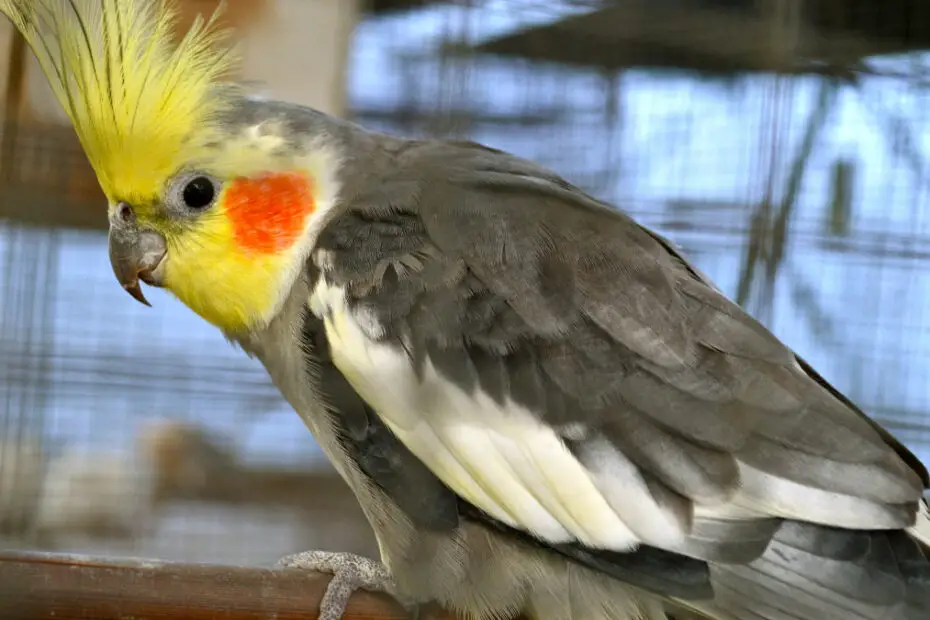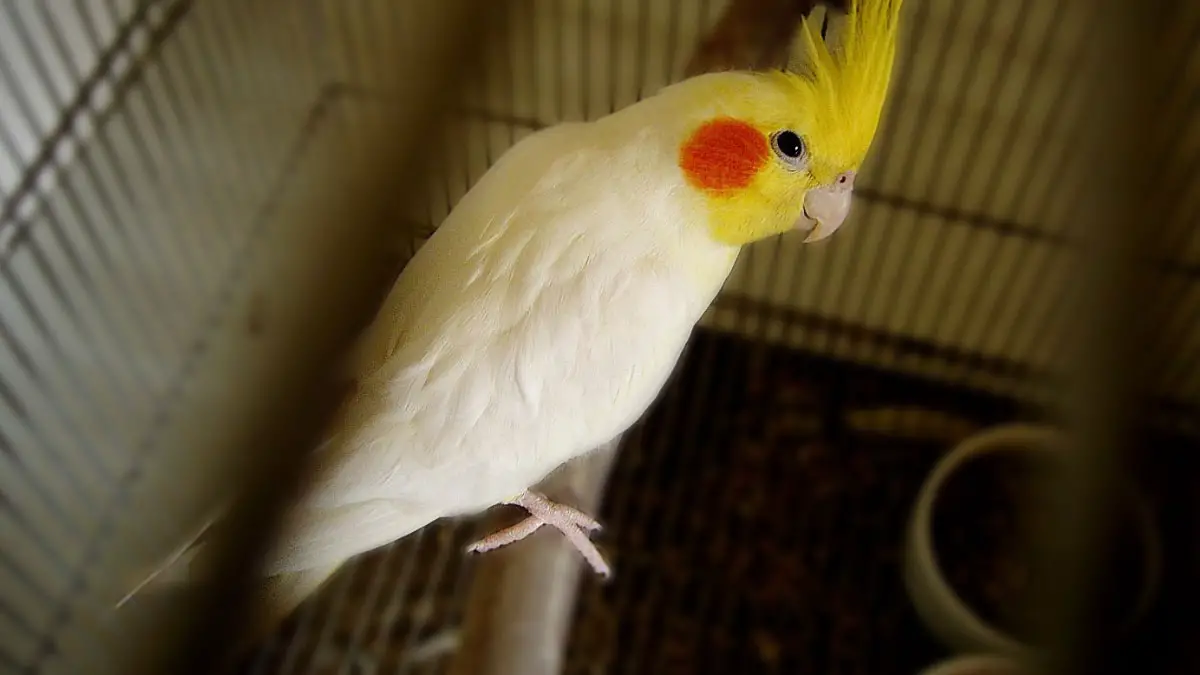Feather loss of pets is a very common concern for most cockatiel owners. Cockatiels tend to preen and shred feathers almost all year long, and it is a common and natural process.
The beautiful plumage of feathers over the skin of a cockatiel almost always indicates its health. If it is losing too many feathers and the feathers are not regrowing any time soon, you have a problem at hand.
There could be multiple reasons for such an issue, such as excessive stress, lack of socialization and petting, skin infections, and sometimes parasites! All of these problems require medications and natural remedies such as Vimeral, brotone liver tonic, coconut oil, etc. Along with adjustment in your cockatiel’s lifestyle and environment.
However, cockatiel feather loss during molting is just a natural process and they molt twice a year to lose almost all the old defective feathers and grow new ones.
But for any new cockatiel petter, it is indeed hard to understand! When the shredding of feathers indicates a problem and when it is just another natural phenomenon for your cockatiel. Hence we have composed this article for you to cover all the concepts relating to the feather shredding of cockatiels.
From the diagnosis of any diseases that your cockatiel is afflicted by to their remedy, we shall cover all such topics in this article below.
Understanding Feather Loss In Cockatiels
Just like reptiles shred skins to remove dead cells and parasites, birds shred their feathers to help in their flight. As the feathers grow old, they become damaged and do not stay optimal for prolonged flight. Hence, birds shred feathers annually to renew them.
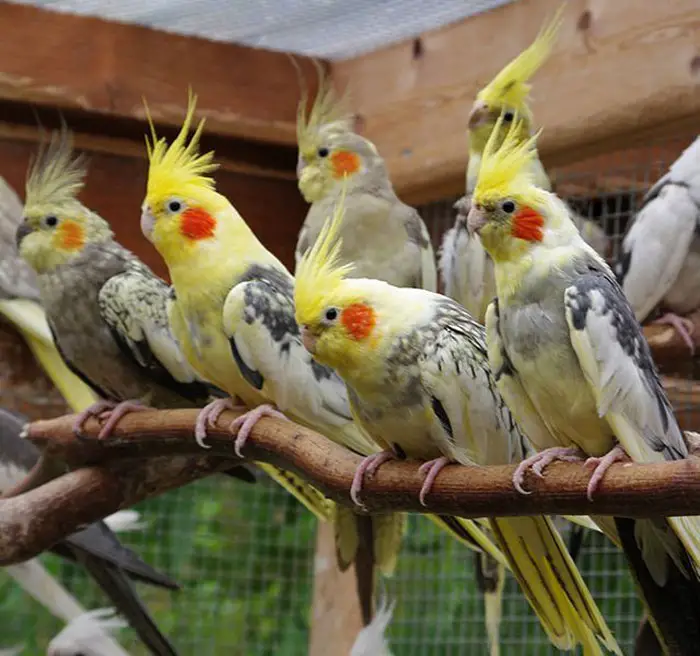
Understanding When Feather Loss Is A Problem
A simple equation to understand if your cockatiel has a feather loss problem is just observing whether your pet has pin feathers after shredding. Pin feathers are simply new immature feathers that are in the process of growing into full-fledged plumage.
However, Molting is a natural process and does not contribute to feather loss in cockatiels as new pin feathers are on their way to grow and replace the old ones. However, the first sign of any problem regarding feather loss is when the birds are shredding feathers, but there are no pin feathers to compensate.
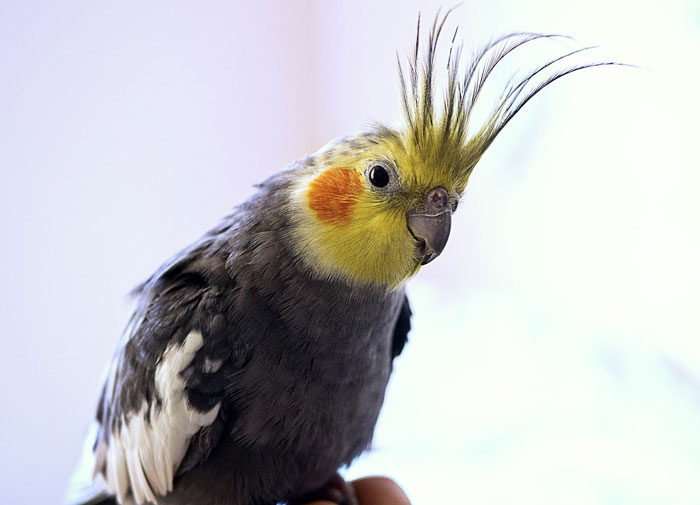
The main reason for the lack of pin feathers is when your cockatiel is afflicted by some sort of disease. Two of the most common ones are discussed down below.
1. Psittacine Beak And Feather Disease (PBFT)
The main concern is when your cockatiel is losing feathers and there are traces of pin feathers on its skin. And it’s called PBFT. It is a very infectious and deadly disease with a very high fatality rate!
PBFT causes feather and beak abnormalities, such that both the feathers and the beak starts to deform slowly. The feathers fall off and the beak becomes very weak and vulnerable. Hence along with feathers, beak care is also important during PBFT.
The pin feathers that could have compensated for the old feathers shredding off are also affected. They fall off the cockatiel’s skin prematurely and never get to grow fully.
Additionally, it also causes long-term immunological suppression; in simple terms, it reduces the effectiveness of your pet’s immune system. Consequently, your cockatiel falls ill very often afterward.
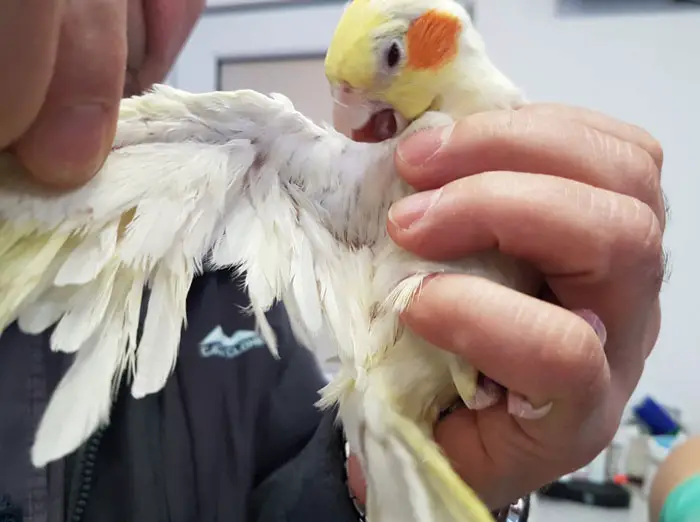
Symptoms
PBFT disease has very subtle symptoms until they have fully manifested inside your bird. The early symptoms may be as subtle as slight skin rashes, feather loss, and difficulty eating hard, crunchy meals as the beak is also affected.
After the virus fully manifested itself, the symptoms were very vivid. Almost no feathers are left on the skin, brittle beak, and non-salubrious body.
Remedy
Unfortunately, there are no vaccination or medicine available to cure this disease. It has a very high fatality rate and the lack of treatment makes PBFT even more terrifying.
The only remedy is to nurture your cockatiel’s immune system. Its immune system is the only major defense that could beat PBFT.
Prevention
Likewise, the only way to save your pet from such a terrifying disease is by prevention.
- Cleanliness is your best friend!
- Additionally, if you happen to notice any symptoms of PBFT, contact a vet immediately to confirm if your bird has the disease.
- Separate it from the rest of your bird pets as PBFT is extremely contagious and could affect not only cockatiels but any bird species.
2. Skin Infections
Cockatiels are very vulnerable to skin lesions, itchy eczema, or scabies. These make their skins itchy, which leads to excessive preening and feather plucking. Preening helps clean the feathers, but in return, a few old feathers also fall off.
However, excessive preening causes damage to healthy feathers and makes them prone to shredding.
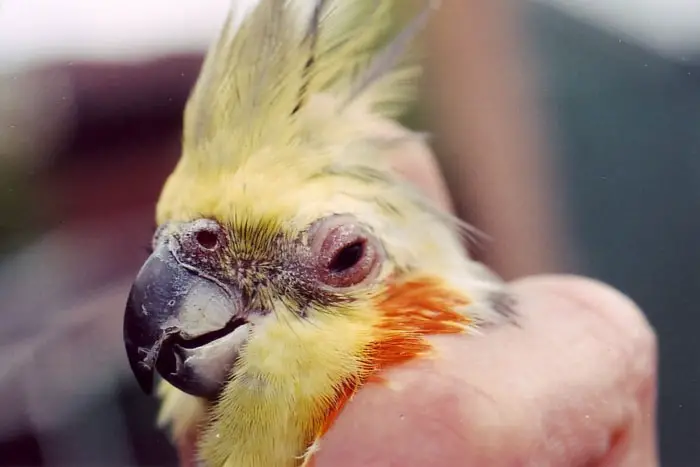
Symptoms
Signs of skin rashes are the major symptoms. However, you may also notice irritation of your bird during petting and excessive preening.
Remedy
There are ailments and medicines to aid your pet. Contact avian vets to prescribe the meds for your pet.
Prevention
The main way to prevent most avian diseases is cleanliness and this disease is no exception. Sometimes, wing clipping can also be a viable option if your bird is very irritated.
Promoting Feather Regrowth Through Diet And Nutrition
If your cockatiel is not inflicted by any illnesses, the lack of nutrition is the only explanation for its feather loss. Additionally, maintaining a proper diet with adequate nutrition is the perfect way to feather regrowth.
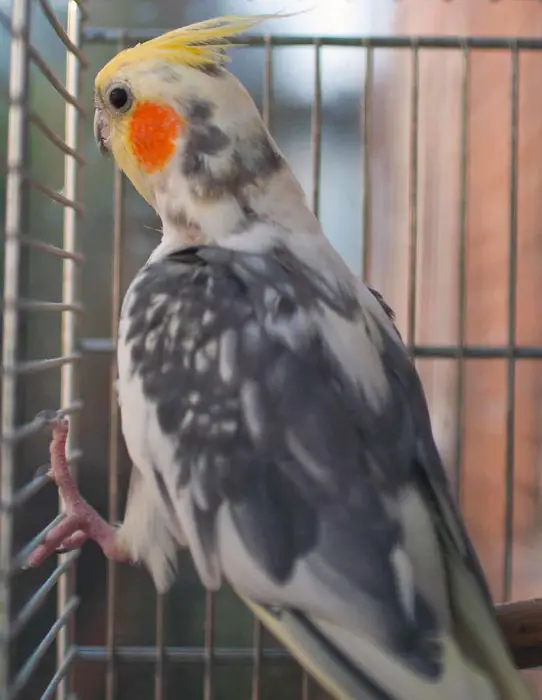
Importance Of Protein In A Cockatiel’s Diet
The diet directly reflects a cockatiel’s plumage. The fluffy feathers that cover up the entirety of a cockatiel’s skin consist mostly of a protein known as keratin. Digging a bit into feather anatomy, we learn that keratin is responsible for almost 85% of a feather’s total mass.
Hence, a lack of protein in a cockatiel’s diet ultimately results in poor feather health that makes its feathers exceptionally prone to shredding prematurely. Also, a lack of amino acids in the diet could lead to similar problems.
Amino acids are responsible for generating protein from within an organism’s body. A lack of amino acids in the diet can never be compensated with extra protein intake. Both amino acid and protein not only prevent cockatiel feather loss but also helps in feather regrowth; hence, it is never too late to change the diet.
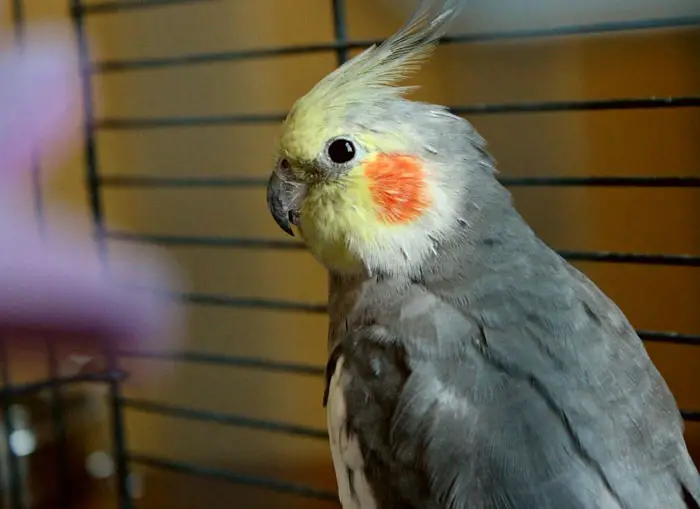
Importance Of Fatty Acids And Vitamin A
The skin of birds releases a special sort of body oil when the pin feathers start maturing. This body oil consists of Vitamin A and acts both as a protective layer and as an agent to boost feather regrowth.
Vitamin A is especially important to include in a cockatiel’s diet when it is in a heavy molding period. It is important to note that vitamin A does not readily get absorbed by a cockatiel. That is where fatty acids play a huge role!
They help not only in the absorption of important vitamins like vitamins A, D, E, and K but also help in muscle growth and development in the wings.
Importance Of Fresh Fruits And Vegetables In A Cockatiel’s Diet
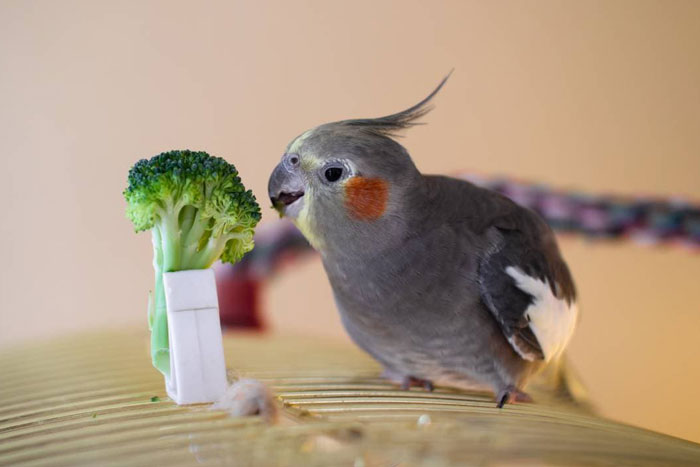
As discussed before, proper feather care requires a variety of nutrition in a daily diet. Lots of vitamins and minerals that are otherwise unattainable for our avian pet can be served through the means of sweet fruits and green vegetables.
A healthy diet recommended by several avian dietary experts suggests at least 20%-25% of a cockatiel’s diet be composed of fruits and vegetables. Otherwise, their daily nutrition intake could be inadequate.
Diet Chart
To obtain the perfect diet plan for your cockatiel, it is recommended to see a specialist in the avian diet. As much like us humans, different cockatiels have different nutrient needs and different appetites. Hence, their diet can only be properly composed by bird nutritionists.
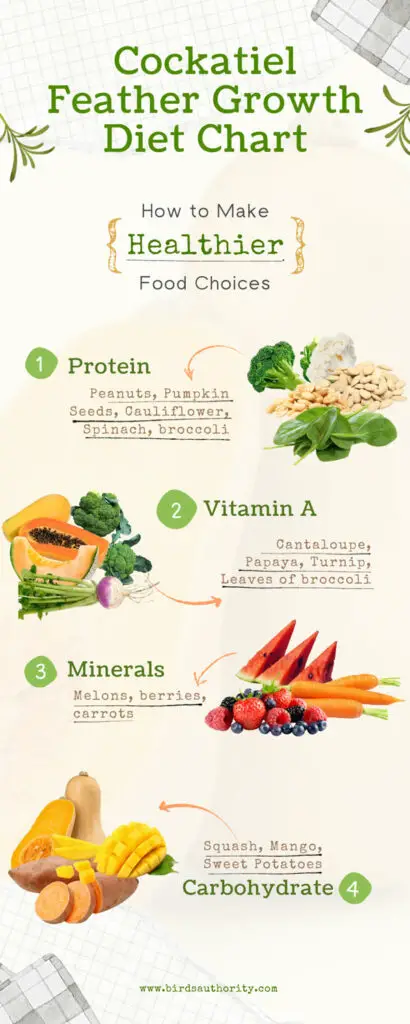
To ensure that your cockatiel receives all the nutrients it needs, we have provided a diet chart below. It details the food names that will provide those certain required nutrients to your cockatiel.
| Nutrients | Food |
| Protein | Peanuts, Pumpkin Seeds, Cauliflower, Spinach, broccoli |
| Vitamin A | Cantaloupe, Papaya, Turnip, Leaves of broccoli |
| Minerals | Melons, berries, carrots |
| Carbohydrate | Squash, Mango, Sweet Potatoes |
Environmental Factors And Feather Loss
As mentioned earlier, excessive preening and feather picking contribute to feather loss. Environmental factors, as discussed below, can also trigger excessive preening other than skin rashes.
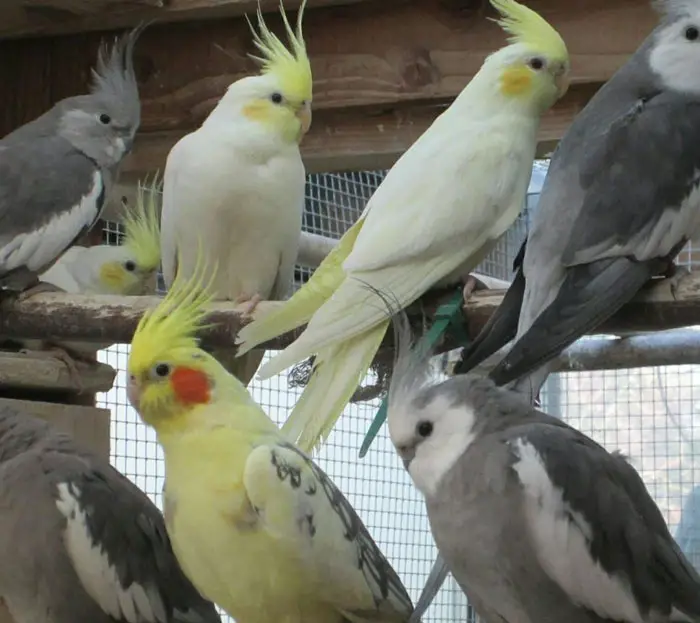
Ambiance
Cockatiels are adapted birds to live in hot, humid conditions. However, just because they are adapted to live in such conditions does not mean they like warm ambiance.
Rather, as feathers work as an insulator, they like to preen and pluck their feathers off if the room temperature gets too hot. The ideal room temperature for cockatiels is between 70-75 degrees Fahrenheit.
Studying a bit of cockatiel anatomy informs us that Almost 80% of a cockatiel’s body is covered by insulating feathers. Also, they have a very high metabolic rate which explains their hyperactivity. Such unique traits keep their body warm even in cold temperatures. Hence, too much humidity and hot ambiance trouble them a lot.
Lighting
The lighting of the room in which the cockatiel resides is important. It is not quite yet proven, but many experienced avian vets do believe that a poorly lit room causes depression and stress in cockatiels. They are adapted to live under bright sunlight. Hence poor lighting negatively affects their mood.
Hence, cockatiel tends to preen and mold excessively in dark environments. If they are not sleeping, it is recommended to light up the room decently for environmental enrichment.
To-Do
It is recommended to light up the room decently for preventing any depressive behavior harboring your cockatiel. Also, make sure to alter the room temperature accordingly so that they do not pluck their feather off for excessive heat and humidity.
Behavioral factors and feather loss
As already discussed, a very warm ambiance causes lethargy in cockatiels. In any active animal’s lifestyle lethargy causes stress as they are no longer able to expend their daily quota of energy. And this is a very generic avian behavior; they pluck their feathers and self-mutilate when stressed.
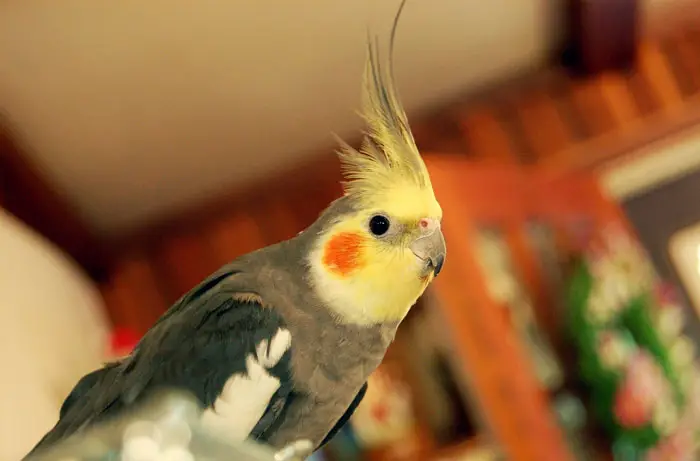
Symptoms Of Stress In Cockatiel
If a cockatiel is stressed, it will have a drastic drop in appetite. Also, it would not interact with you or any other bird in its cage well. Assert territorial dominance and aggression. Most importantly, it would start hurting itself.
Preventing Such Behavioral Issues
So, it is important to point out that even if you are busy, make sure your cockatiel has enough toys around to expend its energy. There are complimentary bird toy companies like The Bird Toy Store or Super Bird Creations that you can reach out to.
Cockatiel feather loss due to stress is optimally prevented by playing with your cockatiel and interacting with or grooming his back. As long as they have a happy and healthy mood with no illnesses, feather loss should never be a problem.
Medical Treatments For Feather Loss
All of the medicines listed below should only be used after a prescription from an avian vet. As these medicines may vary their effect depending on your cockatiel’s conditions.
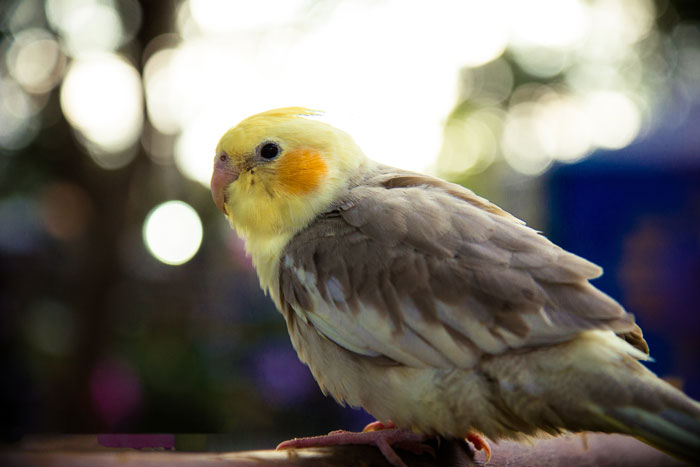
Vimeral
If you notice your cockatiel having a bareback after molding, but there are traces of pin feathers, this might be a condition where the pin feathers are not being nurtured well enough to grow and replace the old feathers.
This is where Vimeral will help with your bird’s feather regeneration as it contains many necessary supplements. Such as Vitamin A, which helps nurture and protect the pin feathers until they are fully grown. It also prevents skin infections which is also a big help.
Calci-Grit
This is a medicine that improves calcium deficiency. Much like protein, a lack of calcium could also make the feathers weak and prone to shredding.
Consulting an avian vet would likely prescribe this medicine for your cockatiel if it is suffering from calcium deficiency.
Brotone Liver Tonic
This medicine helps to keep the liver of your cockatiel healthy. This helps produce digestive juice to prevent ingestion and always maintain the stress level of your pet.
Birds are very prone to stress if they have stomach-related issues and Brotone liver tonic prevents any of that.
Surgery For Feather Cysts
There are multiple reasons for feather cysts, such as deficiency of proper minerals and self-mutilation. Once the cyst enlarges and a big red lump appears over the skin, surgery is a must.
There are plenty of experienced avian vets that could help you with your endeavor all around the world. Avian vets are professionals in the field of birds and are the only ones licensed and have the expertise to carry out such an operation.
Natural remedies for feather regrowth
There are 2 notable natural remedies for cockatiel feather loss that not only help in feather regrowth but also prevent excessive feather shredding. However, consulting an avian vet is recommended as even natural remedies might have a negative impact depending on your cockatiel’s condition.
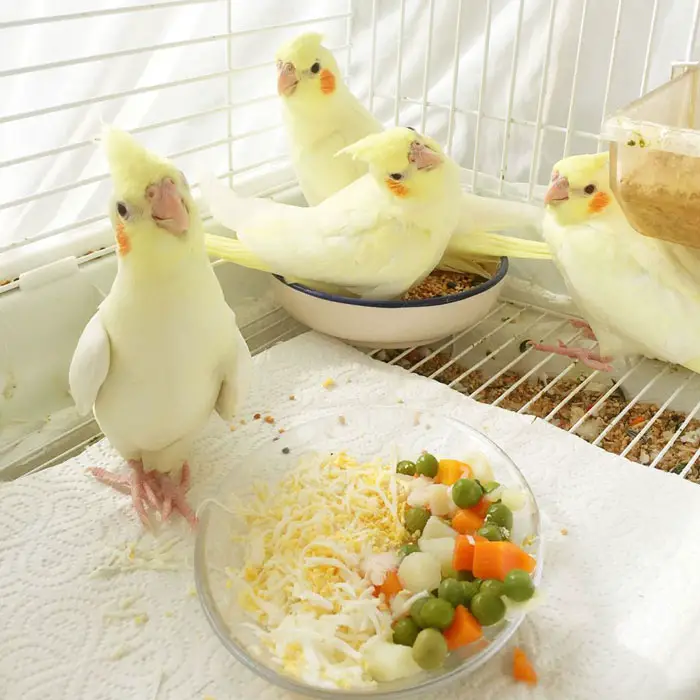
Aloe Vera
It helps clean the surface of the skin of your cockatiel which makes it less prone to preen and lose feathers. Not only does it keep the skin clean, but aloe vera also takes care of any minor rashes.
It can also accelerate feather regeneration as it contains vital vitamins, minerals, and antioxidants. Make sure to use moderate amounts as applying too much can irritate.
Coconut Oil
It is one of the most effective natural bird remedies. Coconut oil contains vitamins and fatty acid, which helps not only nurture the pin feathers but also strengthen the fully grown feathers. It helps in moisturizing the surface of the skin, hence ultimately making the feathers a lot healthier and stronger.
Make sure to not apply coconut oil on bald spots excessively as it can raise your pet’s temperature and make it irritated.
Conclusion
Feather loss can be due to illnesses such as PBFT and skin infections. All of their symptoms and remedies are also listed above. We have discussed how to help cockatiels with feather loss through medicinal and natural remedies. Using prescribed medications such as Vimeral and calci-grit can go a long way. Also, ensuring your pet is in a properly lit room and has a perfect ambiance can quickly recover its health.
Overall, just looking after its diet and physical health won’t ensure your cockatiel’s happy and contentful life. Playing with or grooming your cockatiel can have a massive impact on both their feather loss and feather regeneration. Lastly, you should never hesitate to consult with avian veterinarians for proper diagnosis and treatment.
